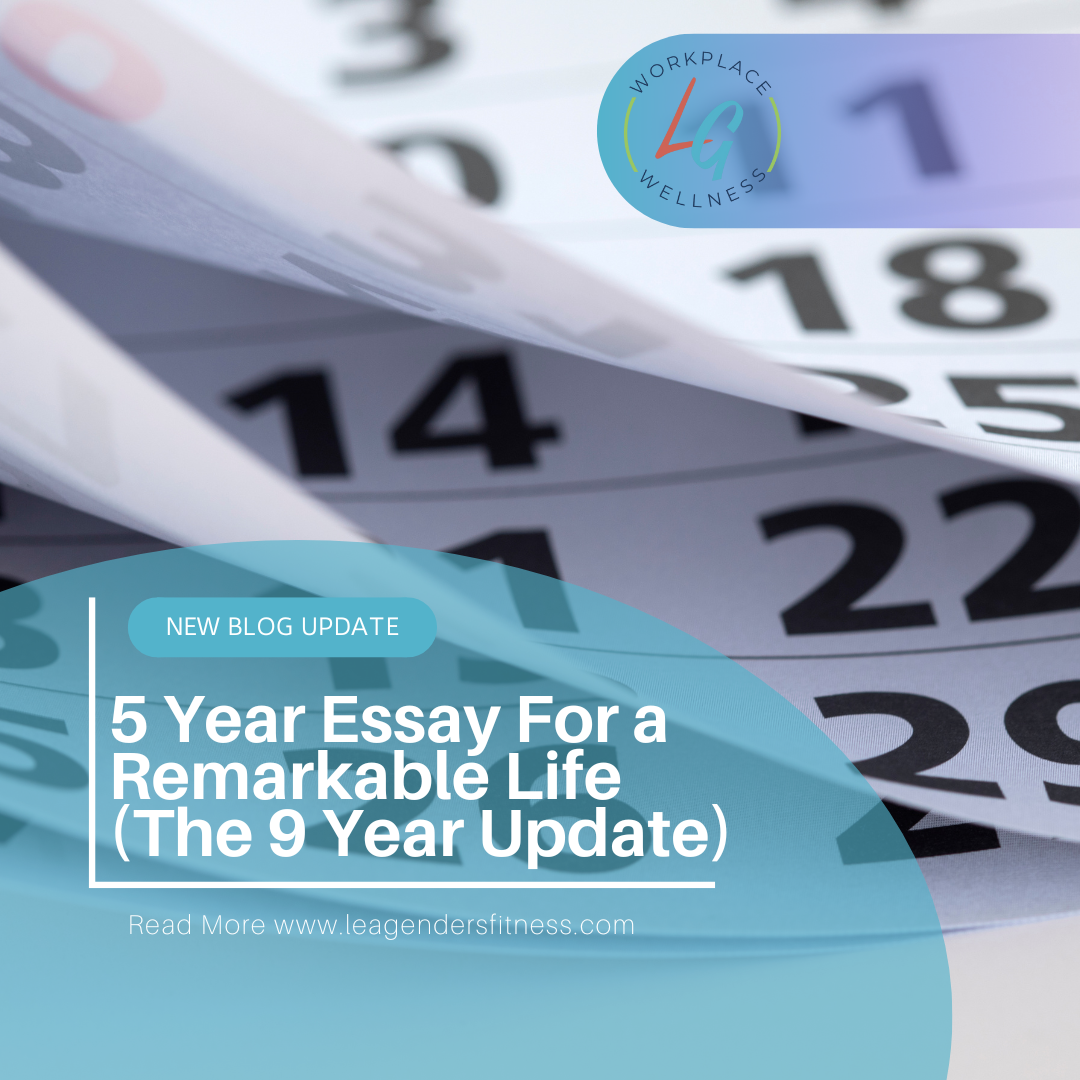Are you someone who feels conflicted between what you should do and what you want to do and hopes to make better choices and decisions to improve your long-term health?
I will cover some tangible ways to revise your thinking, environment, situation, and habits for the best chances of success with behavior change. Why? Because people with greater self-control are more likely to achieve their goals!
It's that time when people start thinking about goals and resolutions for the new year. Did you know there is science behind why we do this? In the research paper by Angela L. Duckworth, Katherine L. Milkman, and David Laibson Beyond willpower: Strategies for reducing failures of self-control, they talk about a concept called "Fresh Start Framing'
"By emphasizing fresh starts on the calendar as opportunities to make self-controlled decisions, a small but growing body of evidence suggests it may be possible to encourage more self-controlled choices."
New Year's Day, the day after your birthday, the first day of a new month, the first day of school, a new job, a move, and even a brand new morning can all be opportunities to make positive changes to your habits and routine with a fresh start mindset! Let's lean into that this time of year and think about some strategies we can use to enhance our ability to make positive changes to our habits.
But be mindful of what is realistic for your current lifestyle and abilities because the paper also outlines how we often erroneously think we will make better choices with more willpower and patience in the future.
If we are not behaving a certain way today, what will have to change to do it in the future? We usually don't magically adopt better self-control habits without putting in some hard work. The truth is change is hard; it's messy and rarely linear. I don't say this to discourage you but to offer some reassurance that the struggles you may have had adopting healthier options are perfectly normal.
Have you ever told yourself, "I will enjoy myself this weekend and start over on Monday?" Or "Starting January 1, I will go to the gym five days a week, but for now, it's a Netflix marathon," or "No more sugar after Christmas, after I finish off all these cookies." "I'll quit drinking in January, but I can't let all this beer go to waste now." But then, when those dates roll around, you fall back into the same old patterns? Join the club, fellow humans.
When faced with an immediately more enjoyable option in the present, almost everyone struggles to make a choice that will benefit their future selves. When choosing to watch Netflix on a cold winter day or drive to the gym, it's in our nature to lean towards the more comfortable choice than the one that is in the best interest of our future selves.
I see this as good news. If you struggle with willpower, it is not a personality defect or sign that you're doomed to repeat destructive patterns forever; it's human nature—But it's not an excuse.
“Never turn a limitation into an excuse.”
Once you are more aware of these natural tendencies, you can start to make informed choices and changes that will benefit your health and longevity rather than fall into default actions that don't help your future self.
What strategies can we use to improve our self-control to make choices that benefit our future selves?
We can change our thinking, or we can change our environment and situations to build habits. The paper I mentioned above explores the types of science-backed change strategies that may be effective for reducing the failures of self-control.
As you read through, think about how you might combine some of these strategies and experiment to find out what works best for your lifestyle, personality, and preferences. As with most things, no one-size-fits-all is appropriate for everyone. If something doesn't resonate with you, find something else. If you try a technique that doesn't work for you, it's not a failure but a lesson. Take what you learned and try something else. Most importantly, don't attempt everything at once! One small step forward at a time is the best for long-term change.
COGNITIVE STRATEGIES FOR SELF-CONTROL
Let's start with how you think about and approach your goals.
GOAL SETTING:
Writing out a clear goal can be a potent reminder of why you want to make better choices. Post your goals somewhere you can often review (i.e., the lock screen on your phone, magnetized to the fridge, a post-it on the bathroom mirror, etc.). Writing it down is more effective than having an idea in your head.
Write out your clear goal using S.M.A.R.T. goal guidelines (specific, measurable, actionable, realistic, timely) and review it often.
Go ahead. I’ll wait.
PLANNING:
As the new year approaches, everyone is talking about resolutions, but as we know, we need to do more than state our goals. We must plan when, where, and how we will take action towards them.
These plans are the foundation of our goal achievement.
Break your big goals down into smaller actionable goals. i.e., I want to run a marathon, my goal is to run five days a week, my daily goal is to set my shoes out, schedule time on my calendar to run, and ensure I am getting eight hours of sleep at night.
Be careful about using planning as a form of procrastination. Read another book, plan out all your workouts for the next twelve weeks on a spreadsheet, listen to another podcast...then I'll start. If we are not doing things because we are spending all our time gathering knowledge, that can be a way of avoiding action. You can read 100 books on how to ride a bike, but you will never learn until you start pedaling.
Don't let the prep stage keep you from the actual doing-the-work stage. Do you see this tendency in anything you do? Awareness, again, is the first step toward change.
What steps can you take towards planning action towards your goal?
SETTING NON-NEGOTIABLE MINIMUMS
What minimum daily action must you do to work towards your goal? The mistake we sometimes make is we set out and do too much, get burned out or overwhelmed, and give up too soon. Any action is better than no action. Building small, healthy habits always provides better results than going hard for two weeks and quitting.
Plan to go to the gym four days a week, but give yourself a two-day-a-week minimum, no matter how short the session. It's a best-case/worst-case scenario. Even in the worst-case week, you squeeze in two twenty-minute gym sessions. You can always do more, but the minimum is non-negotiable.
It could be a daily step goal minimum, fifteen minutes of body weight exercises in your living room, or a daily one-minute plank. It could be five minutes of walking for every hour sitting or fifteen minutes of walking after every meal. Whatever your minimums are, they have to be something you can consistently achieve (so don't make them too big, a.k.a. one hour in the gym six days a week or heavy back squats every day—more is not always better). Then, even when things don't go as planned (because we live on earth and things rarely do), we can rest well knowing we at least did our minimums.
What minimums, if any, can you set for yourself?
MENTAL CONTRASTING WITH IMPLEMENTATION INTENTIONS
Mental contrasting is thinking of the best possible outcome, the obstacles you might face, and then making a plan if that happens. This strategy helps remind yourself that goal achievement is not always easy, so you are not surprised or derailed by obstacles.
The WOOP method can be helpful in thinking through this process:
Wish (Goal or Resolution)
Outcome (How will achieving this goal change your life? How will you be different? How will it make you feel?)
Obstacles (What obstacles are you likely to face in pursuing this goal?)
Plan (What will you do when you are faced with these obstacles?)
Again, write it down. What obstacles have you faced in the past? What is likely to happen going forward? What will you do when faced with potential hurdles?
PSYCHOLOGICAL DISTANCING
Reframe the situation using a third-person perspective.
Being objective about our problems is hard, so thinking from an outside perspective is helpful. "Lea doesn't feel like running because it's cold outside, but she has a marathon coming up. What should Lea do?" The answer becomes clearer than when you think, "I don't feel like running today."
As a coach, I have to do this often when faced with an issue of my own. If a client asked me about this problem, how would I advise them? It's often different than my first instincts for myself.
To Myself: “Do I run even though my foot hurts? It’s not that bad, just a bit of discomfort.”
My initial reaction: Sure, toughen up; it will be fine.
Reframing as a client conversation, it becomes clearer: No way, get some rest, see a doctor if it persists.
It takes work to be objective about your training and nutrition (which is why it can be helpful to hire a coach and why coaches often hire their own coaches).
I am more kind and realistic with my clients than instinctively with myself. Can you do the same? How would you approach the situation with a loved one? How do you talk to yourself? Is your inner voice a mean girl (or guy)? Would you speak to a child this way? Love yourself and talk to yourself with the same understanding and compassion you would with those you love. Being hard on yourself and tough love is rarely an effective motivator.
If you can’t hire a coach (or even if you can), learn to talk to yourself as a coach. “You can do it” can be more effective self-talk than “I can do it.”
Mindfulness / JOURNALLING
Mindfulness is non-judgemental awareness. Take notice of your thoughts and behaviors and how they interact—without judgment. Recognizing your thoughts and behaviors is the first step in changing them. We often act without thought.
Part of the reason I blog is because it helps me work through my thoughts. Getting your problems, issues, goals, dreams, and obstacles out of your head and down on paper or a keyboard can help clarify in a way that just thinking about it can't.
As Billy Ocean once said, "Get out of my dreams, get into my car journal. (Yes, I think I am funny.)
You don't have to be a blogger or writer to get these benefits.
Write down how you feel before you eat and after you eat. Take note of how different foods make you look, feel, and perform (positive, negative, or neutral). Write about what you are thinking before ("I don't wanna wah") and after a workout ("I feel so great!"). Then, review for trends. Awareness can help you make more positive choices.
FUTURE-SELF THINKING
Begin to act as someone who already achieved your goal might act. What does a marathoner do daily? What do athletes eat, how much water do they drink? Do they prioritize sleep, and what are their habits? Start behaving like the person you want to become.
I found this so helpful when I was a new trainer. I would say, "I'm a trainer now; I can't be skipping workouts; I need to set a good example." I wanted to act as I thought a trainer would act.
(Of course, now we all know trainers are human too; we make mistakes, eat junk food, and miss workouts too—right?)
But this line of thinking helped me cement habits that still work for me today. I'm not saying you need to run out and get certified, but acting like the type of person you want to be can help you become more like them. Kind of like WWJD? But for health and fitness, hah.
When faced with a choice, ask yourself if your decision will benefit your future self.
Future-self-thinking also helps when writing out your goals; write them in the future tense as if you have already achieved them when you have not—yet.
"I am so happy that I can do ten chin-ups in a row; I feel so strong and capable and now look forward to what is next." (by the way, I am at seven—humble brag.)
ENVIRONMENTAL, SITUATIONAL, AND HABIT STRATEGIES FOR SELF-CONTROL
Now, how can we set up our environment, situations, and habits for better self-control?
TEMPTATION BUNDLING
Try putting together something you want to do with something you need to do to make the less desirable activity more enticing. For example, only watch the latest episode of your favorite streaming show when on the treadmill or stationary bike.
I meditate in the sauna because I love the sauna, but meditation is hard for me. Or try listening to your favorite podcast only while at the gym. Increase consistency by combining indulgent and desired behaviors.
Build positive habits by temptation bundling. What activities can you combine to increase the frequency of a desired behavior?
SITUATION MODIFICATION
Situation modification is a deliberate change in an environment favoring long-term goals. Keep the kid's junk food out of sight on the highest shelf in the pantry. Choose not to buy the gallon ice cream, only the single-serve size. Bring fresh fruit to the office and set out in plain view. Leave the chips on the store shelf. Put your gym shoes and clothes out the night before. Do you have any ideas on how you could modify your environment to improve your chance of success?
SURROUND YOURSELF WITH POSITIVE INFLUENCES
"You are the average of the five people you spend the most time with" - Jim Rohm
I am not suggesting you dump all your loser friends (kidding!). But try to increase positive influences by surrounding yourself with people who already live your desired lifestyle. Follow them on social media, join a gym or running community, hire a coach, take a class, or join a training group. Whether you like it or not, the people around you influence your behavior, so work to build a circle of people who inspire and build you up. Use peer pressure to your advantage. You can't choose your family or co-workers, but you can start building a community of positive influences around you.
Think about your social circle. Can you think of ways to expand it to include people who inspire you towards your goals?
THE MOST IMPORTANT STEP! DON’T SKIP!
Chances are, nothing you read here today was entirely new for you—right? These are concepts you have heard or read about before. Most of these are simple, but simple isn't always easy.
There are a lot of ideas here. Too much at once can lead to feeling overwhelmed. The key is to choose one or two that resonate and focus there.
Can you put a plan in place to try one or more of these strategies? What makes sense, given your current lifestyle and goals? Start small. Grab a notebook, write down some goals, and plan and execute. The purpose of knowledge is action. Elevate what you read today by doing!
Approach it as an experiment. What new habits can you test and see if they work for you? You can't fail. You either succeed, or you learn. Keep going. How can I help?
Did you like this post? Do you know someone who might benefit? It helps me when you share with your friends and followers.
Questions? I’d love to help.
















I titled this the Dieting Toolkit, but really, it is the anti-diet approach you have been looking for. We break down the messy math of calorie deficits, why restriction almost always backfires, and how to use the continuum to get results without being perfect.